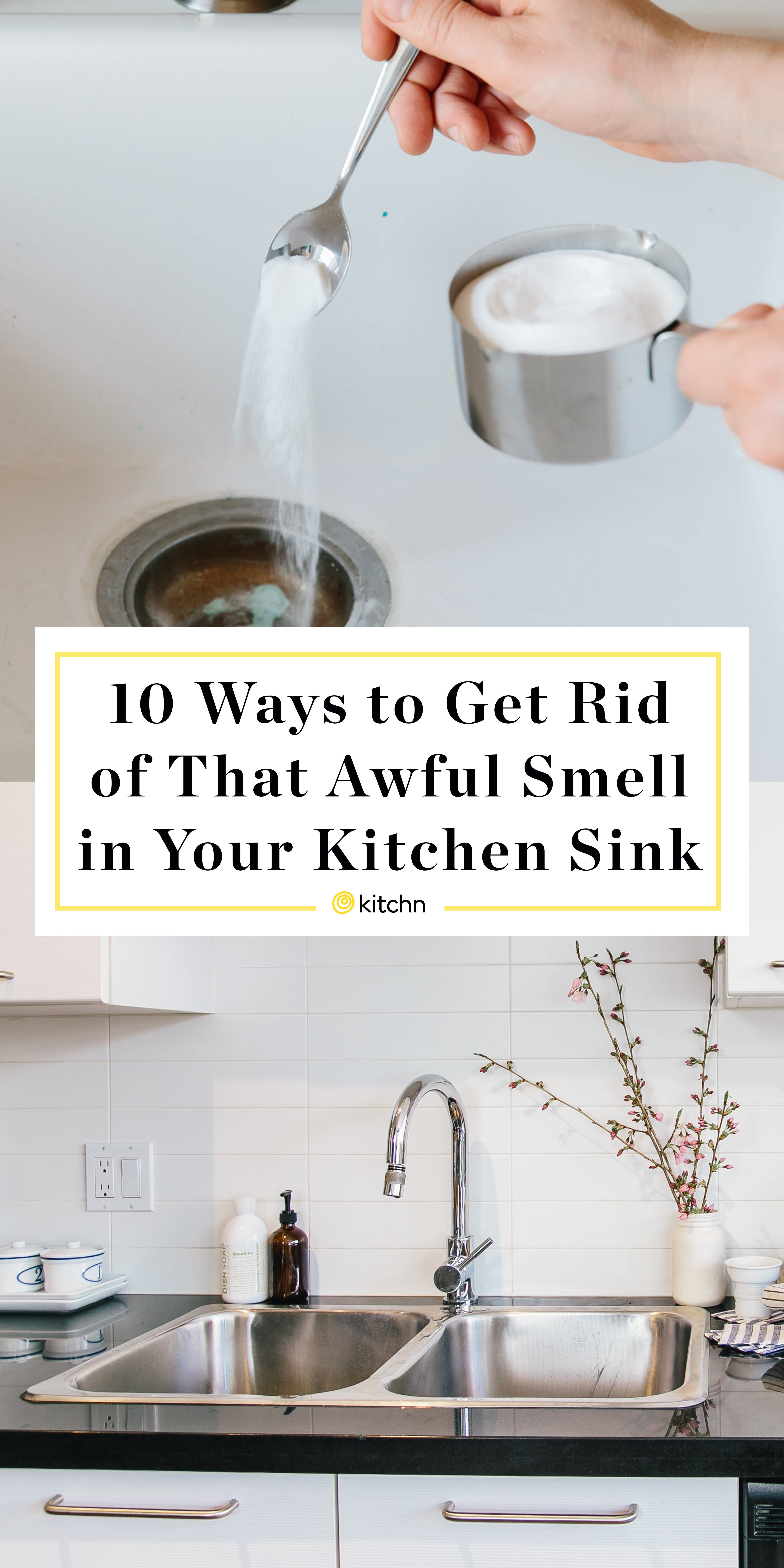How to get rid of smell in kitchen sink? You can eliminate kitchen sink odors using methods like flushing with hot water, baking soda and vinegar, salt and boiling water, or citrus peels. Regular cleaning and maintenance are key to preventing future smells. This article will explore various quick and natural ways to tackle kitchen sink odor removal, offering practical smelly drain solutions for a fresher, cleaner kitchen.

Image Source: cdn.apartmenttherapy.info
Why Does My Kitchen Sink Smell?
The first step in kitchen sink odor removal is figuring out where the smell comes from. Knowing the kitchen sink smell causes allows you to deal with the problem at its source.
Common Culprits Behind Smelly Drains
- Food Scraps: Bits of food get trapped in the drain. These decompose and create foul smells.
- Grease Buildup: Grease hardens inside the pipes. It catches food and blocks water flow.
- Bacteria: Bacteria thrive in the damp, dark drain. They break down organic matter and release bad odors.
- Clogged P-Trap: The P-trap is the curved pipe under the sink. It traps debris. If it’s full, it can smell.
- Garbage Disposal Issues: Old food in the garbage disposal rots. This is a major source of bad smells.
- Biofilm: A sticky layer of bacteria and grime can coat the drain walls. This is hard to remove.
- Infrequent Use: Drains that are not used often can dry out. This allows sewer gases to rise.
- Ventilation Problems: If the drain vent is blocked, sewer gases can’t escape outside.
Quick Fixes for Kitchen Sink Odor Removal
Sometimes, a quick and easy solution is all you need to freshen up your kitchen.
Hot Water Flush
- How it works: Hot water can melt grease and flush away loose debris.
- How to do it: Run hot water down the drain for several minutes.
- When to use it: As a daily maintenance step or when the smell is mild.
Baking Soda and Vinegar Drain
This classic combination is a powerful natural drain cleaner. It’s perfect for kitchen sink odor removal.
Table: Baking Soda and Vinegar Drain Cleaning
| Step | Instruction |
|---|---|
| 1 | Pour 1 cup of baking soda down the drain. |
| 2 | Follow with 1 cup of white vinegar. |
| 3 | Let it fizz for 30 minutes to an hour. |
| 4 | Flush with hot water for several minutes. |
| 5 | Repeat if necessary. |
Salt and Boiling Water
Salt acts as an abrasive, helping to scrub the drain walls.
- How it works: The salt loosens debris. The boiling water washes it away.
- How to do it: Pour 1/2 cup of salt down the drain. Follow with a pot of boiling water.
- When to use it: For minor clogs and odors.
Citrus Peels
Citrus peels contain natural oils that can deodorize and freshen your drain. This is a simple way to deodorize kitchen sink.
- How it works: The oils break down grease and leave a pleasant scent.
- How to do it: Grind citrus peels (lemon, orange, or grapefruit) in the garbage disposal. Run water while grinding.
- When to use it: For a quick, fresh scent boost.
Deep Cleaning Your Kitchen Sink Drain
When quick fixes don’t cut it, it’s time for a more thorough clean kitchen sink drain. These methods target the source of the smell.
Cleaning the P-Trap
The P-trap is a common spot for debris to collect.
- What is the P-Trap? It’s the U-shaped pipe under your sink.
- How to clean it:
- Place a bucket under the P-trap.
- Loosen the slip nuts at both ends of the P-trap.
- Carefully remove the P-trap and empty its contents into the bucket.
- Clean the P-trap with a brush and soapy water.
- Reassemble the P-trap, making sure the nuts are tight.
- Run water to check for leaks.
Addressing the Garbage Disposal Odor
A smelly garbage disposal can stink up the whole kitchen. Here’s how to get rid of garbage disposal odor:
- Ice and Salt:
- Fill the disposal with ice cubes.
- Add 1 cup of salt.
- Run the disposal with cold water for about a minute. The ice and salt scrub the blades and walls.
- Baking Soda and Lemon Juice:
- Pour 1/2 cup of baking soda down the drain.
- Add the juice of one lemon.
- Let it sit for 30 minutes.
- Flush with hot water while running the disposal.
- Cleaning the Splash Guard: The rubber splash guard can trap food particles. Remove it and scrub it with soapy water.
Using a Drain Snake
A drain snake can reach deeper into the pipes to remove clogs.
- How it works: The snake pushes through clogs and pulls out debris.
- How to use it:
- Insert the drain snake into the drain opening.
- Rotate the handle to feed the snake down the drain.
- When you feel resistance, continue rotating to break up the clog.
- Pull the snake back out, removing any debris.
- Flush the drain with hot water.
Enzyme Drain Cleaners
Enzyme drain cleaners use enzymes to break down organic matter.
- How it works: Enzymes digest food, grease, and other waste.
- How to use it: Follow the instructions on the product label. Usually, you pour the cleaner down the drain and let it sit overnight.
- Why choose this method: Enzyme cleaners are safe for all types of pipes.
Natural Drain Cleaner Recipes
Making your own natural drain cleaner can be cost-effective and environmentally friendly.
Baking Soda, Salt, and Boiling Water
- Ingredients:
- 1/2 cup baking soda
- 1/4 cup salt
- Boiling water
- Instructions:
- Pour the baking soda and salt down the drain.
- Follow with boiling water.
- Let it sit overnight.
- Flush with hot water in the morning.
Borax, Salt, and Vinegar
- Ingredients:
- 1/4 cup borax
- 1/4 cup salt
- 1/2 cup vinegar
- Instructions:
- Pour the borax and salt down the drain.
- Follow with vinegar.
- Let it fizz for 30 minutes.
- Flush with hot water.
Yeast and Warm Water
- Ingredients:
- 1 packet of active dry yeast
- 1 cup warm water
- Instructions:
- Mix the yeast with warm water.
- Pour the mixture down the drain.
- Let it sit overnight.
- Flush with hot water in the morning.
Preventing Kitchen Sink Smells
Preventing smells is easier than getting rid of them. These tips will help you maintain a fresh-smelling kitchen.
Regular Cleaning Habits
- Flush with Hot Water Regularly: Run hot water down the drain after each use to prevent buildup.
- Use a Drain Strainer: A strainer catches food particles before they enter the drain.
- Clean the Sink Basin: Wipe down the sink basin regularly to remove food residue.
- Periodically Clean the Garbage Disposal: Use ice and salt or baking soda and lemon juice.
Best Practices for Garbage Disposal Use
- Don’t Overload the Disposal: Cut food into small pieces before putting it in the disposal.
- Run Cold Water While Using the Disposal: Cold water helps solidify grease, allowing it to be flushed away.
- Avoid Certain Foods: Don’t put grease, bones, coffee grounds, or starchy foods (like pasta and rice) down the disposal. These can cause clogs.
- Run the Disposal Regularly: Use the disposal at least a couple of times a week to prevent buildup.
Tips for Maintaining a Clean P-Trap
- Flush the P-Trap: Periodically flush the P-trap with hot water to remove debris.
- Check for Leaks: Make sure the connections are tight to prevent leaks and water damage.
- Clean Regularly: Clean the P-trap every few months to prevent buildup.
When to Call a Plumber
Sometimes, the problem is beyond what you can handle yourself.
Signs You Need Professional Help
- Persistent Odor: If the smell doesn’t go away after trying multiple cleaning methods.
- Slow Drainage: If the sink drains slowly, even after cleaning the P-trap and using a drain snake.
- Frequent Clogs: If you experience frequent clogs, it could indicate a more serious issue in the pipes.
- Gurgling Sounds: Gurgling sounds coming from the drain can indicate a problem with the plumbing vent.
- Sewage Backup: If you experience sewage backing up into the sink, call a plumber immediately.
What a Plumber Can Do
- Diagnose the Problem: Plumbers have the tools and expertise to identify the source of the smell.
- Clear Stubborn Clogs: They can use professional-grade equipment to remove tough clogs.
- Repair or Replace Pipes: If the pipes are damaged, a plumber can repair or replace them.
- Address Ventilation Issues: They can diagnose and fix problems with the plumbing vent.
- Offer Preventative Maintenance: Plumbers can provide tips and services to prevent future problems.
Fathoming the Science Behind Kitchen Sink Smells
To further address how to deodorize kitchen sink, we must discuss the biology behind the scents. Decaying food particles release volatile organic compounds (VOCs) that create unpleasant smells. These VOCs can include sulfur compounds, ammonia, and other byproducts of decomposition.
Additionally, bacteria and fungi present in the drain contribute to the breakdown of organic matter, creating even more foul-smelling substances. Grease, fats, and oils solidify and trap food, providing a breeding ground for microorganisms.
Interpreting Different Types of Smells
Different smells coming from your drain can tell you exactly what’s going wrong down there. If you catch a whiff of rotten eggs, it’s usually a sign of sulfur caused by bacteria growing in a spot without much air. If it smells more musty or earthy, you’re probably dealing with mold or mildew. Knowing the difference between these scents makes it much easier to figure out how to fix the problem.
Table: Smell Indicators & Potential Causes
| Smell | Potential Cause |
|---|---|
| Rotten Egg | Sulfur compounds produced by anaerobic bacteria |
| Musty | Mold or mildew |
| Ammonia | Decomposition of organic matter, often urine related |
| Rancid Oil | Grease buildup |
| General Decay | Decaying food scraps |
FAQ: Kitchen Sink Smell
- Can I use bleach to clean my drain? While bleach can kill bacteria, it can also damage pipes and create toxic fumes when mixed with other cleaners. It’s best to avoid bleach and use safer alternatives.
- What is the best way to prevent kitchen sink smells? Regular cleaning, using a drain strainer, and avoiding putting grease and certain foods down the drain are the best ways to prevent smells.
- Who is responsible for fixing a smelly drain in an apartment? Landlords are usually responsible for maintaining plumbing and fixing drain problems. Contact your landlord if you experience persistent smells or clogs.
- Why does my kitchen sink smell only sometimes? Intermittent smells can be caused by infrequent use of the sink, allowing sewer gases to rise. Regularly flushing the drain can help prevent this.
- What is the best natural drain cleaner? Baking soda and vinegar is a popular and effective natural drain cleaner. Enzyme cleaners are also a good option.
By following these tips and techniques, you can tackle kitchen sink odor removal effectively and keep your kitchen smelling fresh and clean. Regular maintenance and prompt action are key to preventing smells from returning.

Hi, I’m Larry Fish, the mind behind MyGrinderGuide.com.. With a passion for all things kitchen appliances, I created this blog to share my hands-on experience and expert knowledge. Whether it’s helping you choose the right tools for your culinary adventures or offering tips to make your kitchen more efficient, I’m here to guide you. My goal is to make your time in the kitchen not only easier but also enjoyable! Welcome to my world of kitchen mastery!
